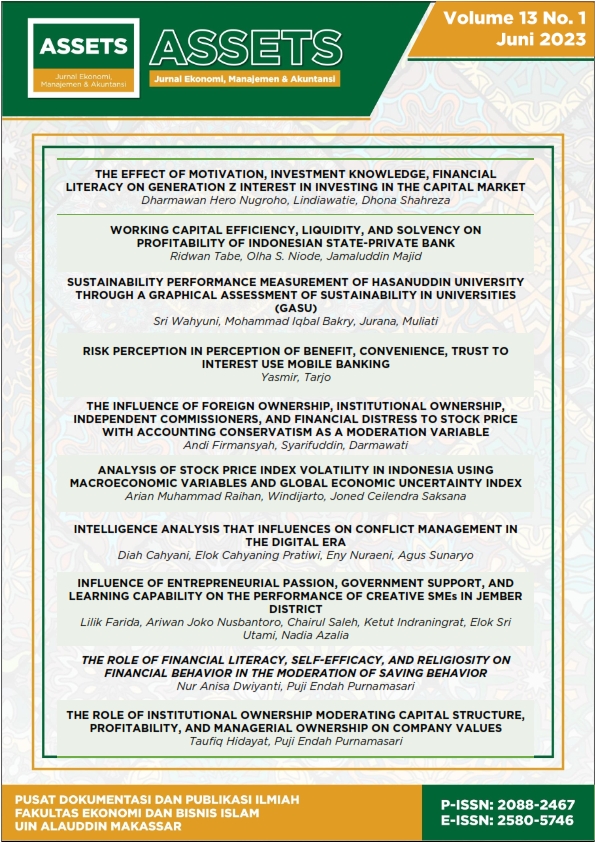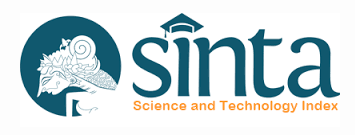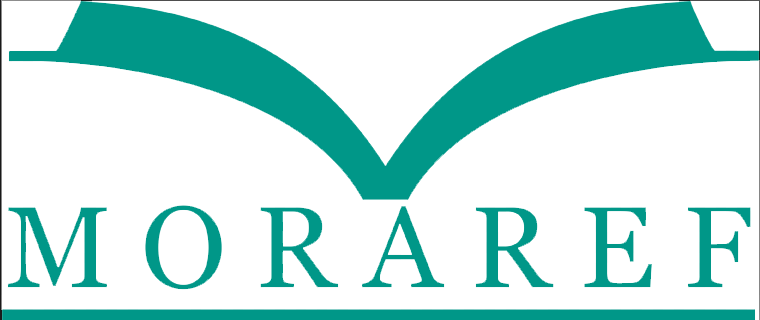THE EFFECT OF MOTIVATION, INVESTMENT KNOWLEDGE, FINANCIAL LITERACY ON GENERATION Z INTEREST IN INVESTING IN THE CAPITAL MARKET
Abstrak
Kegiatan investasi di pasar modal telah menarik perhatian generasi muda yang berusia kurang dari 30 tahun. Mereka adalah generasi Z yang lahir setelah tahun 1995 hingga 2010 atau 2012. Penelitian ini dilaksanakan untuk mengetahui faktor motivasi, pengetahuan investasi dan literasi keuangan terhadap minat generasi Z berinvestasi di pasar modal. Metode pengambilan data dengan menyebarkan kuesioner kepada 96 responden generasi Z di Jakarta dan dianalisis dengan analisis regresi berganda. Hasilnya adalah faktor motivasi, pengetahuan investasi dan literasi keuangan berpengaruh signifikan dan positif terhadap minat generasi Z berinvestasi di pasar modal secara parsial dan simultan. Namun faktor literasi keuangan lebih besar pengaruhnya jika dibandingkan dengan faktor pengetahuan investasi. Dengan demikian faktor motivasi sebagai faktor internal akan menimbulkan minat yang besar bagi generasi Z dalam berinvestasi di pasar modal apabila didukung oleh faktor eksternal berupa penyampaian pengetahuan investasi dan literasi keuangan yang benar. Karena hal itu akan membawa perubahan sikap dan perilaku keuangan yang baik.
Referensi
Alfarauq, AD, & Yusup, DK (2020). The Effect of Islamic Capital Market Knowledge and Investment Motivation on Garut Millennial Investment Interest in the Islamic Capital Market. Financial- Journal of Sharia Financial Management , 1 (1), 33–41. https://doi.org/10.15575/fsfm.v1i1.10052
Armstrong, M., Taylor, S. (2014). Amstrong handbook Human Resource Management Practice (13 Edition). KoganPage. www.koganpage.com
Ardani, A., & Sulindawati, NL (2021). The Influence of Investment Application Development, Investment Risk and Investment Knowledge on Interest in Capital Market Investment in Millennials and Generation Z of Bali Province in the Pandemic Era. Vocational : Accounting Research Journal | , 10 (1), 19–26. https://ejournal.undiksha.ac.id/index.php/JJAKUN/article/view/56143
Baihaqqy, M, R, IS (2020). Investment Decisions Of Investors Based On Generation Groups : A Case Study in Indonesia Stock Exchange. Coopetition : Scientific Journal of Management , XI (3), 189–196.
Belisca, A., Hidayat, M., & Syofiana. (2022). Analysis of Factors Influencing Interest in Investing in the Capital Market for the Millennial Generation. Journal Of Social Research , 1 (6), 518–534. https://doi.org/10.55324/josr.v1i6.109
Benesick, A., Csikos, G., Juhaz, T. (2016). Y and Z Generations at Workplaces. Journal of Competitiveness, 8 (3), 90–106.
Chairani, R., Bestari, MFO, & Hidayat, VS (2021). Analysis of the effect of financial literacy on investment decisions. Journal of Science, Socio Humanities , 5 (1), 691–698.
Daviano, E. (2022). Thesis The effect of financial literacy and the effect of the closest people on Gen Z participation in the Indonesian capital market . https://lib.ui.ac.id/detail?id=20519448&location=lokal
Hidayat, W., W. (2019). Basic Concepts of Investment and Capital Markets (1st ed.). Uwais Indonesian Inspiration.
Ministry of Education and Culture. (2017). National Literacy Movement, Financial Literacy Support Material (Luh Anik Mayani (ed.)). Indonesian Ministry of Education and Culture.
KSEI. (2022). Indonesian Capital Market Statistics. Indonesian Central Securities Depository Publications , 1–6. https://www.ksei.co.id/publications/demografi_investor
Lara, G., Syaipudin, U., & Widiyanti, A. (2022). Analysis of the factors that influence Generation Z's interest in investing in the capital market . 5 (1), 418–432.
Matondang, A. (2018). Influence between Interest and Motivation with Learning Achievement. Bahastra, Journal of Indonesian Language and Literature Education , 2 (2), 24–32.
OJK. (2017). Indonesian National Strategy for Financial Literacy (Revisit 2017) .
Pajar & Pustikaningsih, A. (2017). The Effect of Investment Motivation and Investment Knowledge on Investment Interest in the Capital Market in FE UNY Students. Profita Journal , 5 (1), 1–16.
Son, Y. . (2016). Theoretical Reviews : Generation Difference Theory. Among Makarti Journal of Economics and Business , 9 (18), 123–134. https://doi.org/http://dx.doi.org/10.52353/ama.v9i2.142
Putri, NMD, & Rahyuda, H. (2017). The Effect of Financial Literacy Level and Sociodemographic Factors on Individual Investment Decision Behavior. E-Journal of Economics and Business, Udayana University , 9 , 3407. https://doi.org/10.24843/eeb.2017.v06.i09.p09
Suryani, W., Tobing, F., & Emelia, Y. (2022). Factor Analysis of Investment Intention : Millennials and Gen Z perspective . 07 (01), 55–62.
Susanti, NS; Hermawan, NA; Pattihahuan, A. (2023). Advances in Technology and Understanding of Generation Z's Interest in Investing in the Capital Market. Incandescent, Management and Business Studies , 1 (2), 76–82. https://e-journal.naureendigition.com/index.php/pmb/article/view/30/20
Törőcsik, M., Szűcs, K., & Kehl, D. (2014). How generations think : Research on generation Z Krisztián Szűcs. Acta Universitatis Sapientiae, Communicatio , 1 , 23–45.
Viana, E, D; Febrianti, F; Dewi, f, R. (2021). Financial Literacy, Financial Inclusion, and Generation Z Investment Interest in Greater Jakarta. Journal of Management and Organization (JMO) , 12 (3), 252–264.
##submission.copyrightStatement##
##submission.license.cc.by-nc-sa4.footer##









